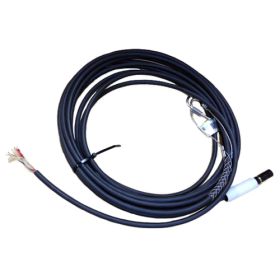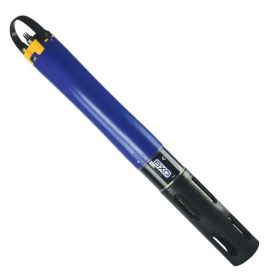- Home
- YSI EXO DCP Signal Output Adapter
YSI EXO DCP Signal Output Adapter
This item is currently on order from the manufacturer, but it has not yet arrived to our warehouse.
For a current estimate of availability, please call 888-426-2151 or or fill out the form below:
This item drop ships directly from the manufacturer, and the actual lead time is dependent on availability at their warehouse.
For a current estimate of availability, please call 888-426-2151 or or fill out the form below:
Fulfillment times may be longer than usual due to component shortages and other factors outside of our control.
For a current estimate of availability, please call 888-426-2151 or or fill out the form below:
Shipping, Delivery, Order Processing & Product Availability
Fondriest uses the best carriers to make sure orders get to you on time. Learn more about shipping times, methods, costs, and carriers.
Delivery Time
Shortly after you place your order, you will receive an Order Acknowledgement email to confirm your order details, including shipping and a delivery estimate. Once your order has been prepared for shipment and shipped, you will receive a Shipment Notification email with the carrier and tracking information.
Shipping and Delivery Estimates
The 'Ships' timeframe is an estimate of when the item will ship from our warehouse. All items will ship at one time unless you specifically request a partial shipment. In which case, the items on your order will ship as they become available.
The ‘Delivers’ timeframe is an estimate of when the item will be delivered. The estimated delivery time depends on the shipping method you choose during checkout. All estimates are based on business days.
Shipping Options
Fondriest offers several convenient shipping options via UPS.
| Ground Shipping: | Products shipped via ground service are typically delivered within five business days after shipment. |
| 2-Day Shipping: | For an additional charge, Fondriest offers 2-day shipping for most products. Products shipped via two-day service prior to 4:00 p.m. EST are usually delivered by 7:00 p.m. local time two business days after shipment. |
| Overnight Delivery: | For an additional charge, Fondriest offers overnight shipping for most products. Products shipped via overnight service prior to 4:00 p.m. EST are normally delivered by 7:00 p.m. local time one business day after shipment. Earlier overnight delivery options may also be available, depending on the destination. |
| Your Account: | For no additional charge, Fondriest can ship on third-party customer accounts via UPS and FedEx. Note that FedEx Ground shipments are picked up the following business day, and Express shipments must be made before 1:00 p.m. EST to ensure same-day pick-up. |
Remember that these estimates are for time in transit only and that they do not apply until the product leaves the Fondriest warehouse. As the delivery of your order is beyond Fondriest’s control once your order leaves the Fondriest warehouse, we cannot assume liability for late deliveries, regardless of the delivery method you specify.
Signature Required on Most Deliveries
Most of Fondriest’s shipments contain valuable equipment. If you will not be at the shipping address to accept delivery of your product, consider shipping the item to an address where someone you trust will be available to sign for your package, or accept your package if a signature is not required for the delivery.
Once your order has prepared for shipment or has shipped, we are unable to change the shipping address. Title and risk of loss to all products will pass to you on delivery. If you are willing to assume the risks of delivering your order without a signature, you may authorize Fondriest to arrange for a delivery that does not require anyone to be at the delivery address.
Undeliverable Packages
Occasionally, packages are returned to Fondriest as undeliverable. When the carrier returns an undeliverable package to Fondriest, please contact us to make arrangements for reshipment.
Failed Delivery Attempts
Most of Fondriest carriers make three attempts to deliver a package. After three delivery attempts, the carrier will return the package to Fondriest.
Order Processing
The estimated shipment date on your order is based on product availability, payment processing time, and warehouse processing time and does not include transit time. We do not begin payment processing until Fondriest receives all of the information that is needed and full payment or a full authorization, in the case of credit card or rental orders.
Fondriest will begin payment processing for orders placed on weekends or holidays on the next business day. Business days are Monday through Friday, excluding federal holidays.
Your order for in-stock items that are eligible for same-day shipping must be received before your local time of 2:00 p.m., pending payment processing, for there to be adequate remaining time in the day for your order to be dispatched.
Product Availability
Fondriest makes every effort to ship your product according to the estimated lead times. The estimated lead times are in business days (Monday through Friday, excluding federal holidays). Although Fondriest makes every effort to ship your order according to the lead time provided, shipping dates may change due to changes in supply. If the lead time changes, Fondriest will contact you via email and provide a revised shipping estimate.
Fondriest makes every effort to supply the products you order, but there may be occasions when Fondriest confirms orders and later learns that it cannot supply the products, either at all or in the quantities ordered. Although rare, these occasions can include when Fondriest learns that the products are no longer being manufactured or they otherwise become unavailable, when Fondriest cannot source components for the configuration you ordered, or when there was a pricing error at the Fondriest Online Store.
In those circumstances, Fondriest will inform you and, if you are interested, Fondriest may suggest alternative products that may meet your needs. If you do not wish to order alternative products, Fondriest will cancel your order for products that cannot be supplied and for any other products that you no longer wish to order as a result, and will issue a refund.
If you are not completely satisfied with your purchase, you may initiate a return within 30 calendar days of receiving your item(s). To begin a return, you must request a Return Material Authorization (RMA) by either contacting your account representative or the general customer support address: customercare@fondriest.com.
Returns without an RMA will not be accepted.
Items returned for credit must be new, unused, and in the original packaging (including any accessories, manuals, and documentation that shipped with the product). Returned items must be received by Fondriest Environmental within 14 calendar days of the issuance of the RMA.
All returned items are subject to inspection and approval prior to the issuance of any credit. If the returned items have been approved, Fondriest will issue a credit based on the original method of payment. Please note that items may be subject to a manufacturer’s restocking fee.
Non-Returnable Items: Fondriest does not permit the return of or offer refunds for the following products:
- Configured-to-order or customized products
- Hazardous materials
- Opened calibration reagents
- Opened software
- Software downloads
- Fondriest Gift Cards
Fondriest recommends using a carrier that offers shipment tracking for all returns. Packages should be insured for the full value in case of loss or damage. Fondriest does not assume any liability for loss or damage to the product during shipping.
- Free ground shipping
- Expedited repair and warranty service
- Lifetime technical support
- More
At Fondriest, we are committed to providing high-quality products at affordable prices with the industry's best support. Additionally, we offer:
-
Discounts
High volume purchases lead to favorable pricing, which is passed on to the customer by way of discount off MSRP.
-
Assembly, Test and Calibration
Sensors and instruments are assembled, tested and calibrated prior to shipment. A calibration report is included.
-
Lifetime Technical Support
A knowledgeable staff of applications engineers provides ongoing support for the life of the product.
-
Product Training
Applications engineers are available for webinars or personalized, on-site startup and training. Extensive measurement technology, product troubleshooting and instrument repair workshops are offered at the Field Station.
-
Extended Warranties
Warranties extended beyond factory standards are offered on many items to ensure a lasting useful life.
-
Repair
A factory-authorized service center provides fast turnaround product repair and annual maintenance.
-
Rental
Rental equipment is available to minimize downtime and cover equipment needs when projects expand.
-
Communications
Call, email or chat online with applications engineers. Email correspondence is responsive and a toll-free number is available for added convenience.
-
Quick Ship
Many orders ship on the same day and expedited shipping is available. If a product cannot be shipped immediately, customers are notified by phone or email.
-
Discounts
- Wires into the end of YSI field cable via flying leads
- Converts signal to RS-232 or SDI-12 for data logger applications
- Requires an EXO Sonde, data logger, and flying lead cable to function
Overview
Introducing the EXO DCP Signal Output Adapter 2.0 from YSI, designed with and engineered for compatibility with the EXO sonde platform. As technology continues to develop at a record pace, it’s more critical than ever to have a flexible sonde that can keep up.
Adaptable
A fundamental part of the EXO Sonde platform is the ability to adapt its communication output to match different monitoring applications. Simply configure a sonde with this adapter, and the instrument is then compatible with data loggers and telemetry systems or PCs and tablets with USB connectivity. Converts the proprietary signal from an EXO Sonde into either SDI-12 or RS-232.
Select Options





have been added to your cart
There are items in your cart.
Cart Subtotal: $xxx.xx
We can't add this item to your shopping cart right now. Please reload the page.
Please first select the items and quantities to add to your Cart.
In The News
Using Buoys to Measure the AMOC: An Ocean Current with Global Climate Consequences
Nicholas Foukal stands on the bridge of a long, pale white boat overlooking the choppy Denmark Strait, the water a greenish-blue hue and dotted with towering icebergs. The deck and boat interior are loaded with research equipment–several large yellow mooring buoys, a remote underwater vehicle, and a plethora of water quality measurement instruments, just to name a few. They’re a reminder of what Foukal has come to this formidable ocean passage to do: study the changes befalling the Atlantic Meridional Overturning Current (AMOC), one of the world’s most important ocean current systems. But as he stares at the massive, rugged snow-capped fjords and glaciers of East Greenland crashing into a seemingly endless turbulent sea, the scale of his task hits him.
NexSens XB-200 Data Buoy Review
Open water monitoring projects can pose many challenges, and NexSens Technology has the solution with the new XB-200 Data Buoy . Easy Deployment Data buoy deployments often require large, expensive vessels with lifting gear. At under 30 inches in diameter and just 67 lbs (plus payload), the XB-200 is easy to transport, deploy and retrieve. The XB-200 can be handled by two technicians and deployed from any small workboat, opening up new monitoring possibilities that were previously cost-prohibitive. The compact size of the XB-200 makes it ideal for inland and nearshore applications, including limnology research, dredge turbidity monitoring, temperature or dissolved oxygen profiling , fisheries and aquaculture monitoring, harmful algal bloom detection , and spill response.
Tracking Three Rivers: Real-Time Buoy Boosts Monitoring and Accountability
When glaciers last retreated across the continental US, over 10,000 years ago, meltwater filled river channels and eroded the landscape. This was how the Allegheny, Monongahela, and Ohio Rivers–among many others–were formed; natural corridors for trade and travel that would, eventually, feed the industrial heart of Pittsburgh. Three Rivers Waterkeeper (3RWK) was founded in 2009 in Pittsburgh, Pennsylvania. 3RWK’s goal is to protect and improve the water quality of the Allegheny, Monongahela, and Ohio Rivers and watersheds, serving as both a scientific and legal advocate for these waterways. Koa Reitz is the Environmental Scientist at 3RWK–a role that entails a lot of data collection and analysis.


 SCHEDULE DEMO
SCHEDULE DEMO







